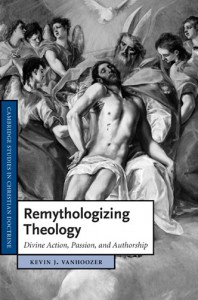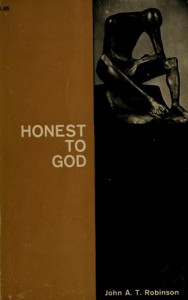 Kevin J. Vanhoozer published a very important book in 2010, entitled Remythologizing Theology. It’s a long book (500 pages), and though Vanhoozer is a clear writer, his target audience here is people who have already read a lot of recent theology. It’s also a very expensive hardcover from Cambridge University Press. Good news on that front: a paperback edition is on the way in 2012.
Kevin J. Vanhoozer published a very important book in 2010, entitled Remythologizing Theology. It’s a long book (500 pages), and though Vanhoozer is a clear writer, his target audience here is people who have already read a lot of recent theology. It’s also a very expensive hardcover from Cambridge University Press. Good news on that front: a paperback edition is on the way in 2012.
Length and price aside, this is a book which deserves a wide audience. I hope Remythologizing Theology makes a big impact on the theological scene in coming years. To that end, I’m going to post some thoughts about the key ideas in the book over the next few weeks. Most of what I’ll post here is from a response paper I read as part of a panel at ETS in November 2011 (along with Oliver Crisp, Steve Wellum, and John Franke). Kevin Vanhoozer was right there when I read the remarks, and since he didn’t call me a liar to my face, that means he kind of endorses what I’m saying about his book, right? I’ll also be adding some comments that I didn’t make at the time, especially on the very rich treatment of divine emotions from the book’s later chapters.
Here’s the opening.
Remythologizing Theology begins beguilingly, with a voice coming down out of heaven. On the mountain of transfiguration, the voice of God testifies aloud to Jesus Christ, “This is my beloved Son, with whom I am well pleased.” “We heard this voice borne from heaven,” reports the apostle Peter, “for we were with him on the holy mountain, and we have the prophetic word made more sure” (2 Pet 1:16-19). There is much going on in the story of transfiguration, and in Peter’s interpretation of it. “Yet what stands out,” says Vanhoozer, “is the voice from heaven.”
 Back in the 1960s when theology could make headlines by killing off its god every now and then, John A. T. Robinson published his provocative book Honest to God (Phil: Westminst Press, 1963). “Our image of God must go,” said Bishop Robinson, scorning the mythological idea of God as a supernatural agent who intervenes in the world; a being like us, but bigger and higher up. There is no way for rational people living a modern world to continue thinking of God as a supernatural being living “up there” somewhere, or even “out there” somewhere.
Back in the 1960s when theology could make headlines by killing off its god every now and then, John A. T. Robinson published his provocative book Honest to God (Phil: Westminst Press, 1963). “Our image of God must go,” said Bishop Robinson, scorning the mythological idea of God as a supernatural agent who intervenes in the world; a being like us, but bigger and higher up. There is no way for rational people living a modern world to continue thinking of God as a supernatural being living “up there” somewhere, or even “out there” somewhere.
Mixing a lot of Tillich and Bultmann with a little late Bonhoeffer (Barth compared the bishop to a man who had scooped the foam off the top of three beer glasses and tried to sell it as a miracle brew!), Robinson called for modern man to recognize that there was no room for God in a scientific universe, except perhaps as the ground of being itself. Fortunately, according to Robinson, Jesus brings a kind of message from this ground of being: “It is in making himself nothing, in his utter self-surrender to others in love, that he discloses and lays bare the Ground of man’s being as Love.” In fact, reflected Robinson, “assertions about God are in the last analysis assertions about Love.”
That was 1963. What would the bishop say if he knew that nearly fifty years later, one of the most estimable theologians in the English-speaking world could, with a straight face and almost no ironic detachment, begin a major work of Christian doctrine with a voice from heaven? The God of Robinson wasn’t even up in heaven, and if he were, he certainly wouldn’t be so rude as to speak from there.
And yet here is Vanhoozer’s big, interesting, intellectually serious book, with a quotation from God speaking in a voice from heaven, on the very first page. And from that opening gambit to the final sentence, “Only the communicating God can help,” (504), the book is “all about voices –literal and metaphorical, biblical and theological, human and divine –and their ongoing interaction (xvii).”
Honest to God, this is a book about God speaking, and Christian theologians taking that voice seriously. But nothing is as simple as Bishop Robinson made it seem when he set up and knocked down his mythological straw god. The real voice of the real God from the real heaven is far more sophisticated than it seemed to the consensus of liberal theologians at midcentury.